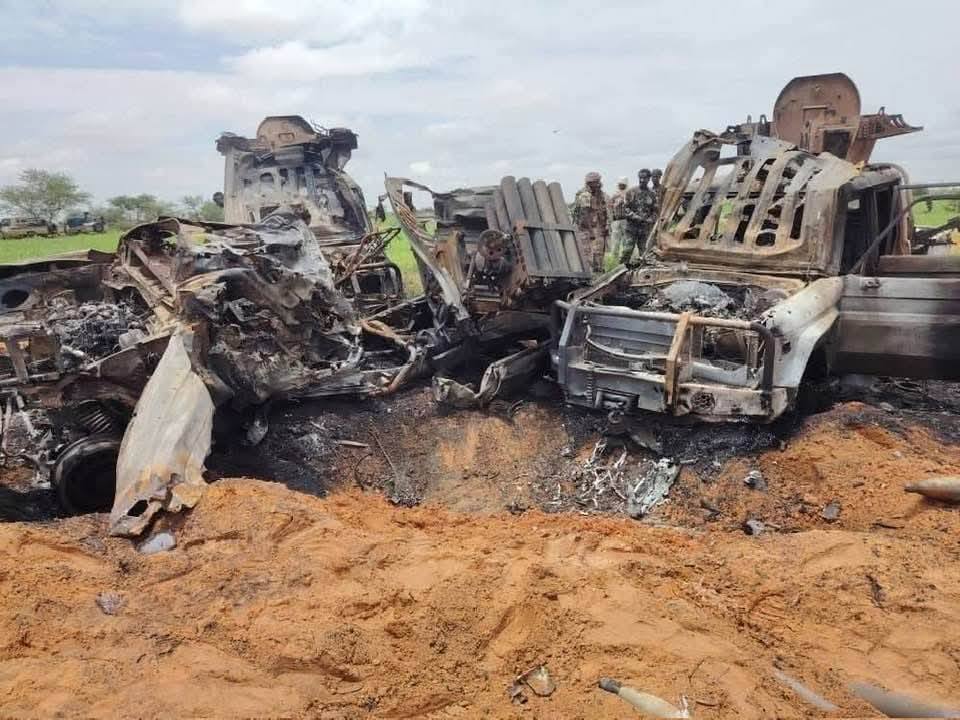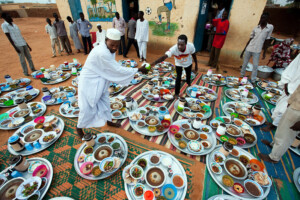North Darfur capital reels under bombardment, ethnic killings, and mounting hunger

Military vehicles that the SAF-aligned Joint Forces claim they destroyed in El Fasher in August (Photo: Joint Forces)
Reports indicate that the paramilitary Rapid Support Forces (RSF) attacked the North Darfur capital of El Fasher, bombarding residential areas and camps for displaced people as warnings of famine and ethnic killings mounted, in the past two days. Residents told Radio Dabanga the RSF renewed artillery shelling on Abu Shouk camp, yesterday morning. On Saturday, RSF units launched another offensive on the city’s southern axis, which the Joint Force claimed it repelled.
The Sudan Doctors Network accused the RSF of striking a hospital in southern El Fasher, wounding seven people, including a nurse. RSF commanders, in turn, released footage boasting of captured medical supplies from both the Sudanese Armed Forces (SAF) and the Joint Force.
Kidnappings and displacement
Abu Shouk’s Emergency Room reported that RSF fighters stormed the camp, abducting eight women and bringing the number of those missing to 20. The International Organisation for Migration (IOM) confirmed the displacement of 1,000 people from Abu Shouk over two days last week, with families fleeing deeper into El Fasher locality.
The RSF circulated videos claiming control over parts of the camp, while the El Fasher Resistance Committees warned that the paramilitaries had penetrated Abu Shouk. Radio Dabanga could not verify these claims due to a communications blackout and reliance on RSF-controlled satellite internet.
The El Fasher Resistance Committees warned the city could fall without urgent intervention. In a statement yesterday, they said El Fasher had endured more than 220 armed attacks during two years of siege, leaving its residents exhausted by fighting, hunger and disease.
They cautioned against relying solely on the El Fasher’s supposed resilience, pointing to the fate of South Darfur’s capital of Nyala, which fell under similar circumstances. Adding that, history would not forgive failure or silence in the face of the city’s suffering.
‘Ethnic killings’
The Sudan Doctors Network accused RSF fighters of executing 13 people along ethnic lines near the Golo water reservoir, west of the El Fasher–Tawila road. Victims reportedly included five children, four women and four elderly men and women.
The UN Human Rights Office Spokesperson Jeremy Laurence (OHCHR) said 89 civilians were killed in RSF attacks on El Fasher over ten days. Laurence confirmed evidence of 16 executions of displaced people from Abu Shouk.
“This pattern of attacks on civilians and murder, which constitute grave violations of international humanitarian law, deepens our concerns about racially motivated violence,” Lawrence said. He warned of famine risks and urged all parties to protect civilians.
The RSF has consistently denied targeting civilians. Radio Dabanga was unable to obtain an immediate response from the group.
De-facto government reaction
Sudan’s Ministry of Foreign Affairs welcomed the UN condemnation of attacks on Abu Shouk camp and ethnically motivated killings. It urged the UN to move beyond words to “urgent and deterrent measures” against the RSF, including implementation of Security Council resolutions, lifting the El Fasher siege and formally designating the RSF as a terrorist organisation.
‘We are very tired’
Inside the besieged city of El Fasher, residents issued urgent appeals for humanitarian aid.
“We are in the camps, shelters, and neighbourhoods of El Fasher. Children suffer from hunger and malnutrition to a degree that is difficult to describe,” said Suad Suleiman Mohamed Khalil.
“Even the elderly suffer from hunger. Medical care has collapsed, immunity is broken, and children and pregnant women are in desperate condition. We urgently need aid to save the remaining citizens of El Fasher.”
Displaced woman Alaa Elnazir Adam Mohammed described a dire situation: “We are present in exceptionally large numbers in the city, but we cannot find anything to eat. Even the animal feed we once relied on is gone. Children suffer severe malnutrition, anaemia is widespread, and the elderly are in crisis. We cannot leave. We appeal to organisations and the government to save us.”
Another resident, Hamid Ibrahim Omar, added: “We are very tired. Even the animal feed has become expensive and unavailable. People, look at us with mercy.”











 and then
and then